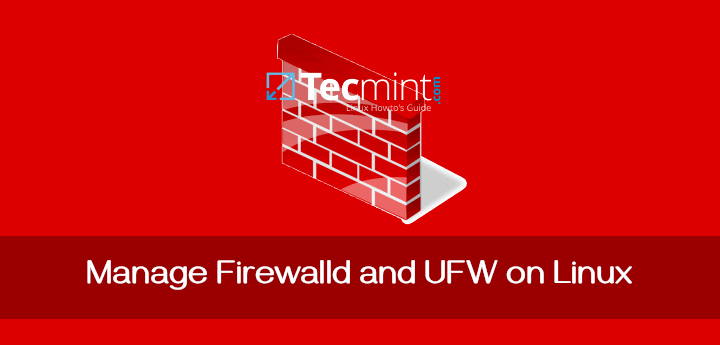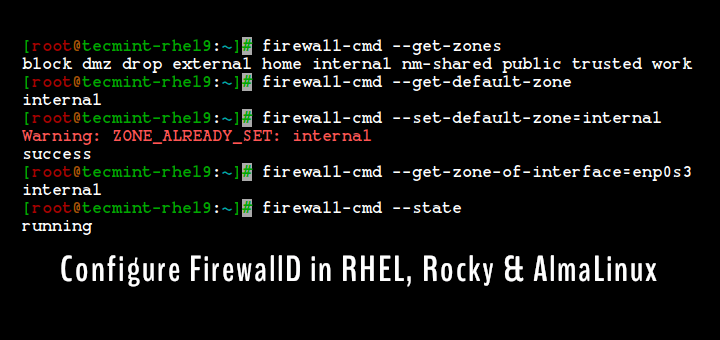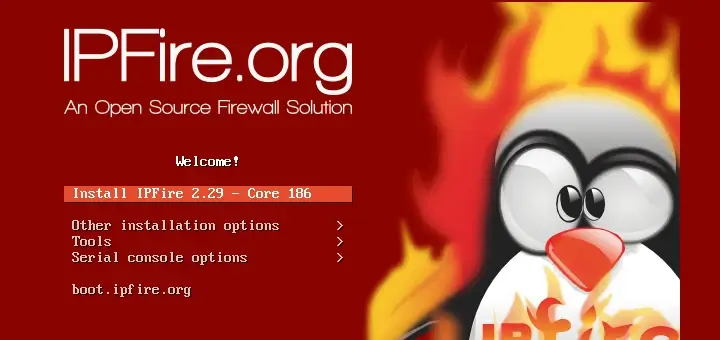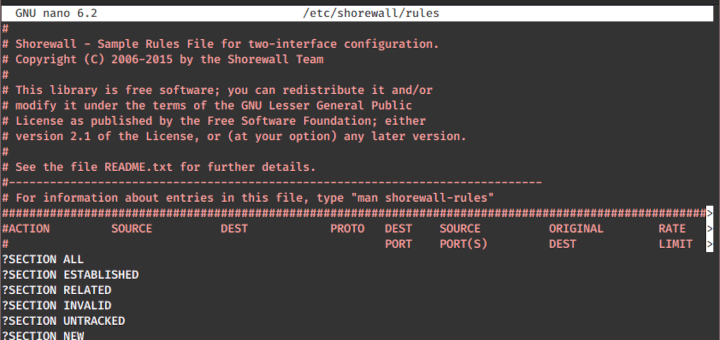As a Linux administrator for over ten years, my primary responsibility has always been the security management of Linux servers. Firewalls play a critical role in securing Linux systems and networks.
They act like a security guard between internal and external networks by controlling and managing incoming and outgoing network traffic based on a set of predefined rules. These firewall rules allow legitimate connections and block those that are not specified.
With numerous open-source firewall applications available today, choosing the right one for your needs can be challenging. In this article, we will explore ten of the most popular open-source firewalls that can help secure your Linux servers in 2024.
1. Iptables / nftables
Iptables has long been the go-to command-line-based firewall for Linux systems. However, in recent years, it has largely been replaced by nftables, which provides a more straightforward and modern interface for managing firewall rules.
Features of nftables:
- Combines IPv4, IPv6, ARP, and netfilter into a single framework, making it easier to manage.
- Enhanced performance through a better packet filtering mechanism.
- Easier to use than iptables, reducing complexity in rule definition.
- Can still use iptables commands while transitioning to nftables.
2. UFW (Uncomplicated Firewall)
UFW is the default firewall configuration tool for Ubuntu, designed to simplify the process of managing firewall rules.
Features of UFW:
- A straightforward command-line interface that is easy to use for newcomers.
- GUFW, a graphical user interface for UFW, is available for both Ubuntu and Debian users.
- Built-in support for IPv6.
- Extended logging options for monitoring activity.
3. pfSense
pfSense is a widely-used open-source firewall/router software distribution based on FreeBSD, which has evolved to include many features typically found in expensive commercial firewalls.
Features of pfSense:
- Web-based interface for easy configuration and management.
- Supports traffic shaping, VPN, DHCP, DNS, and load balancing.
- Active community and extensive documentation.
4. IPFire
IPFire is another open-source firewall designed for small office and home office (SOHO) environments, offering modularity and flexibility.
Features of IPFire:
- Offers robust security through SPI.
- Built-in web proxy and content filtering capabilities.
- Integrated IDS for monitoring and prevention.
5. Shorewall
Shorewall, or Shoreline Firewall, is a powerful open-source firewall that simplifies complex iptables configurations.
Features of Shorewall:
- Allows for easier management of netfilter rules.
- Can manage multiple ISP connections.
- Provides a graphical interface through Webmin for easier administration.
6. OpenWrt
While traditionally known as a Linux distribution for embedded devices, OpenWrt is increasingly popular for its use as a firewall in home networks.
Features of OpenWrt:
- Fully customizable through packages and configurations.
- LuCI web interface for easy configuration.
- Access to a wide range of additional software packages.
7. Endian Firewall
Endian is based on the concept of Stateful Packet Inspection and offers a robust solution for small to medium businesses.
Features of Endian:
- Snort-based intrusion detection and prevention system.
- Integrated content filtering capabilities.
- Provides various VPN options, including OpenVPN.
8. Smoothwall
Smoothwall is an open-source firewall that provides a web-based interface for managing firewall settings and monitoring.
Features of Smoothwall:
- Real-time web content filtering and monitoring.
- Detailed user activity tracking and management features.
- Provides detailed logs and reporting features for traffic analysis.
9. ConfigServer Security & Firewall (CSF)
CSF is a popular firewall configuration script created to provide better security for servers while allowing for easy management.
Features of CSF:
- Monitors login attempts and provides alerts.
- Protects against a variety of common attacks.
- Works seamlessly with popular control panels like cPanel, DirectAdmin, and Webmin.
10. Firewalld
Firewalld is a dynamic firewall management tool for Linux, supporting both IPv4 and IPv6.
Features of Firewalld:
- Allows configuration of different zones to define the level of trust for network connections.
- Supports adding/removing rules without restarting the firewall.
- Provides both command-line tools and graphical interfaces for easier management.
Conclusion
Choosing the right firewall for your Linux server is crucial for maintaining a secure environment. Each of these open-source firewalls offers unique features tailored to different needs, whether for small businesses, home offices, or enterprise environments.
By understanding the capabilities of these tools, you can make an informed decision that enhances the security of your Linux systems. Feel free to share your experiences with these firewalls or suggest any others that you find effective.
Stay tuned for more informative articles on Tecmint.com!







Which firewall are useful for Ubuntu.
Which of them can select, filter, access, deny traffic for processor program name as in windows I so confusing for IP address. Please help if you can, I was using zone alarm or Tini wall in windows is so easy. Why there is not some similar in Linux?
I speak Spanish sorry for my English.
Thanks
Hi,
Great article, thanks for posting. It might also be worth checking out Linewize, we’ve built an open source cloud managed layer 7 firewall which is free to use.
We provide complete visibility over internet use on a per user, device and application basis through our subscription services, all the firewall and filtering goodness is free for anyone to use.
If you’re keen to have a look the install instructions are here linewize.com/install. Keen to know what you think.
Cheers Scott.
There is only one firewall for Linux: iptables, other one in your list is either a frontends for it or some specific Linux-distros or even FreeBSD-based distro. One of the list is WUI for iptables which is distributed in a tarball with sources of files, because all of them are scripts. And a proprietary license. It’s hard to imagine how could one “decompile or disassemble, or reverse engineer” a text file!
There is only one firewall for Linux: Netfilter, other one is either a frontends for it or iptables.
Pretty sure FirewallD is not iptables … ?
Hey there, i am using Brazilfw & Router.
Project BrazilFW – Firewall and Router. A powerful network security tool: easy, safe and totally free!
BrazilFW is a mini Linux distribution designed to be used as a Firewall and Router that runs easily on older computers. An old PC running BrazilFW is much more powerful and efficient than commercial software for routing in offices and residences running on a “powerful” computer.
BrazilFW is based on Coyote Linux, which was designed by Joshua Jackson who discontinued Coyote Linux in version 2.24 in August 2005. In that same month comes on the scene BrazilFW Firewall and Router (BFW) with version 2.24, which is led by “Claudio” and “Marcelo – Brazil”, running only on floppy disks, and being 2.30.1 the last version with this support . The following versions, as well having automatic detection of network cards, only run on large capacity media, such as hard disk (HD).
Versions in Development:
► 2.33.x: Uses kernel 2.4.x and is developed by Marcinho Samurai
► 3.x: Uses kernel 3.x and is developed by WoshMan
Brazilfw 3,0, Come to http://www.brazilfw.com.br and discover the power of this multilinguage firewall ad router distribution.
I need a recommendation please.
I am a Unix / Linux admin, but I have always worked in large corporations, where the firewall rules were done at the network level.
I have no experience with Linux-based firewalls at all.
But, I now have need to restrict traffic between 2 servers, and I believe that a firewall, or proxy might be the best solution to my problem.
I need to create an encrypted tunnel between server “A” and server “B”. This is the easy part.
But, I need to send all traffic between the two servers, through the encrypted tunnel.
Basically, anything going from server “A” to server “B” must travel through the encrypted tunnel.
If the tunnel goes down for any reason, I need the traffic to “stack up”, and wait for the tunnel to be re-established.
Can I do this using firewall rules only?
Can I do this using a proxy only?
Do I need to use a combination of the two?
Of all the open source GUI based firewall admin tools available on the market today, which one might be the easiest to use, and the quickest to learn?
Which one would be the easiest to learn, for a novice that has never had to build a firewall rule before?
Thanks in advance, and have a great day.
Joe
m0n0wall is a project aimed at creating a complete, embedded firewall software package that, when used together with an embedded PC, provides all the important features of commercial firewall boxes (including ease of use) at a fraction of the price (free software).
m0n0wall is based on a bare-bones version of FreeBSD, along with a web server, PHP and a few other utilities. The entire system configuration is stored in one single XML text file to keep things transparent.
m0n0wall is probably the first UNIX system that has its boot-time configuration done with PHP, rather than the usual shell scripts, and that has the entire system configuration stored in XML format.
Hi Tarunika,
I am really impress with this well writen article. Its help me a lot. But I am wondering: is there any kind of UTM linux based free that i can used? i am looking for features like – Web Filtering / Web Content Filter. I know that Dans Guardian can do the job (like smothwall too) but these solutions need that i set up proxy address in the hosts, and i want a solution with ZERO config in any device inside my network. Acctualy with have a FW Cisco ASA 5505 and using a RRAS VPN Microsoft Server with AD users integration. So i would like to put a Linux box (with two NICs) beetween my Firewall Cisco and my Switch Network, acting like a bridge. I konw that UNTANGLE can do the JOB but the full capacity is paid. So.. can yopu give me a tip about this problem? Thanks in advance. ;-)
@ Michael ,
When u says Half baked knowledge is wonderful , assume u have full cooked knowledge.
Asking you a simple question.
I have 5510 Cisco in my org. I want to replace it with and option to opensource but eventually when it finally goes off .
What is the best options.,
It is currently being used for :
1. seting up in-out bounds
2. DMZ
3. VPN
4. less amount of Network monitoring.
Suggest a best piece of the LINUX OpenSource FW ,eventhough it is tough to manage it should be able to update dnsbl list and other UTM/IDS functions up-to-date.
Thanks in advance for your suggestions.
All you need is to type these two commands in a terminal emulator.
No need to install third party firewalls.
sudo ufw enable
sudo ufw default deny
hi , i want block not to uploding my files to internet . like pdf ,ppt, doc, kind of files. users not allow organigation classified information files to gmail attchments . i tried every possible way some of opensource firewalls , but i could not get this kind of policy please help me out with open source firewall and linux.
Squidblacklist.org is the worlds leading publisher of native acl blacklists tailored specifically for Squid proxy, and alternative formats for all major third party plugins as well as many other filtering platforms. Including SquidGuard, DansGuardian, and ufDBGuard, as well as pfSense and more.
There is room for better blacklists, we intend to fill that gap.
It would be our pleasure to serve you.
Signed,
Benjamin E. Nichols
http://www.squidblacklist.org
in my small network i want to block few selected websites and application like torrent downloader….plz suggest me few open source firewalls which can do my work perfectly. i have CentOS 6.3 in admin PC and rest PC are windows.
LOL….
Configserver, UFW, Shorewall… are nothing but front ends to make using iptables easier.
There is only ONE firewall on LINUX – iptables.
Everything else is a front end to iptables. There are more front ends such as Arno’s firewall, KISS etc.
PfSense is a BSD firewall – nothing to do with Linux.
Evidently, half baked knowledge is a wonderful thing.
Sophos is a Limeted from UK. I don’t trust any comercial companies from GB or USA. And furthermore their headquarter in Germany is in Wiesbaden: Thats the new big-knot for NSA spying. I think it would be better you had NO protection than by a company with that footprint!
Maybe when you trust MS, Apple, Oracle, Intel, NSA, BND, GCHQ and all other misanthropists .. thats ok for use.
I prefer setting up and compiling my own cascaded castle with sourcecode and engines I trust. Maybe that’s lot of work – yes it is – but I don’t like to spend my money for dictators and criminal gangs like listed above! Nevermore!
This post is a little old now but…….
So any out there that particularly excel at prioritizing VOIP traffic? At my company we are not really satisfied with lower tier Sonicwalls and find there is a gap cost wise between lower cost and higher cost products for our small to medium sized customers.
In short, I think we are going to start building our own firewalls for our customers.
a month later… reply.
Take a look at Sophos UTM. I have been playing around with different solutions and I am absolutely amazed at the free version. My original goal was to find a solid web filter and played with pfSense, and Untangle. Neither offered what Sophos has; granted for home use its free but for business I do not know how it compares.
Sophos 9.2
Running on:
2GB DDRII
Intel Atom D510 1.66GHz DualCore
(actually its a Cisco NSS322)
Hi,
Can you please recommend a open source Linux firewall cum router which is having below features. We need for Centos6.
1. Need to support three ISP with load balancing and fail over
2. Need to handle all content filtering without proxy(as like hardware firewall). Proxy is controlling only http traffic.
3. Content filtering with category (Need to block sports, news, social category sites instead of defining the exact URL)
4. NAT
I’ll be thankful if you can suggest.
Hi Geeks,
I am Bhanuprasad Kunde. I am working as Sr. Tech. support engineer. I have several times installed CSF firewall as well as APF firewall on our clients web-servers and I have that CSF Firewall is very secured then APF.
Thanks,
Guys am the author of Simplewall.
Simplewall is integrated:
1. Content Filter.
2. IPS(intrusion protection system).
3. OpenVPN.
& much more .
lets try this. Your feedbacks will help us to make it better & better.
Dear Author,
I suggest you to write a review about your product that would cover description, features and installation at tecmint.com for maximum exposure of your product..
I have tried most of them but very recently I heard a heard good reviews about this modsec.. https://waf.comodo.com/. I would like to give it a try and guys lets try this for a better web security.
My question is – do you use one of them, or a combination of several? Do they conflict?
Since they each have a mission to block or allow traffic, I can see these interfering with eachother’s policies, so only use one. If for example using anything other than IPTables, one would have to open up IPTables completely and then allow the other software to manage the ports and access.
Is that how it goes?
hi,
i’m wondering if anyone of these really deliver any useful content inspection. Too me it seems like most of these FW’s do stateful inspection, packet header inspection and so on. But is that really enough ? not seeing deeper into the trafic, must be considered a major weakness in any firewall solution. It seems like the next generation firewalls will have a content inspection on a much higher level. And toady it will most certainly be needed one should think.
Knut
Pfsense with squid & dansguardian will be a wonderful solution.
i have tried iptables, endian, ipcop, clearOS. but sticked w/ pfire for the last two years…u
hi am anand
could u help me that how to configure squid file in linux
Yes, surely help you out, but tell me which OS distro you using?
So, what’s your favourite and why?
(currently i’m using pfSense (still the version 1.2.3)
Hello Nuno,
Thanks for your comment, I prefer the command line so I use Iptables for all my Linux servers and CSF for cPanel hosting servers.
hi how are you?
Could you help me for that squid file configure